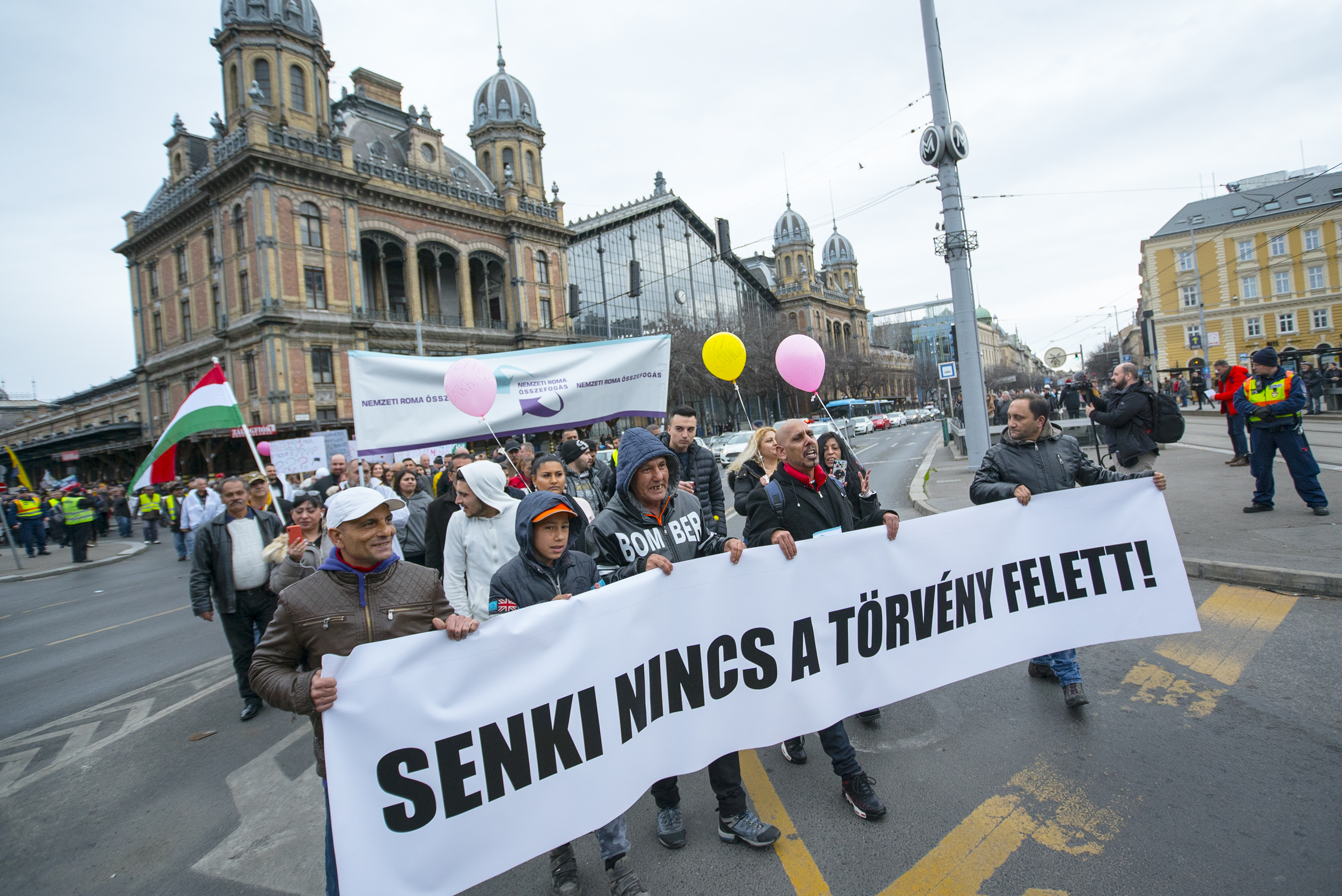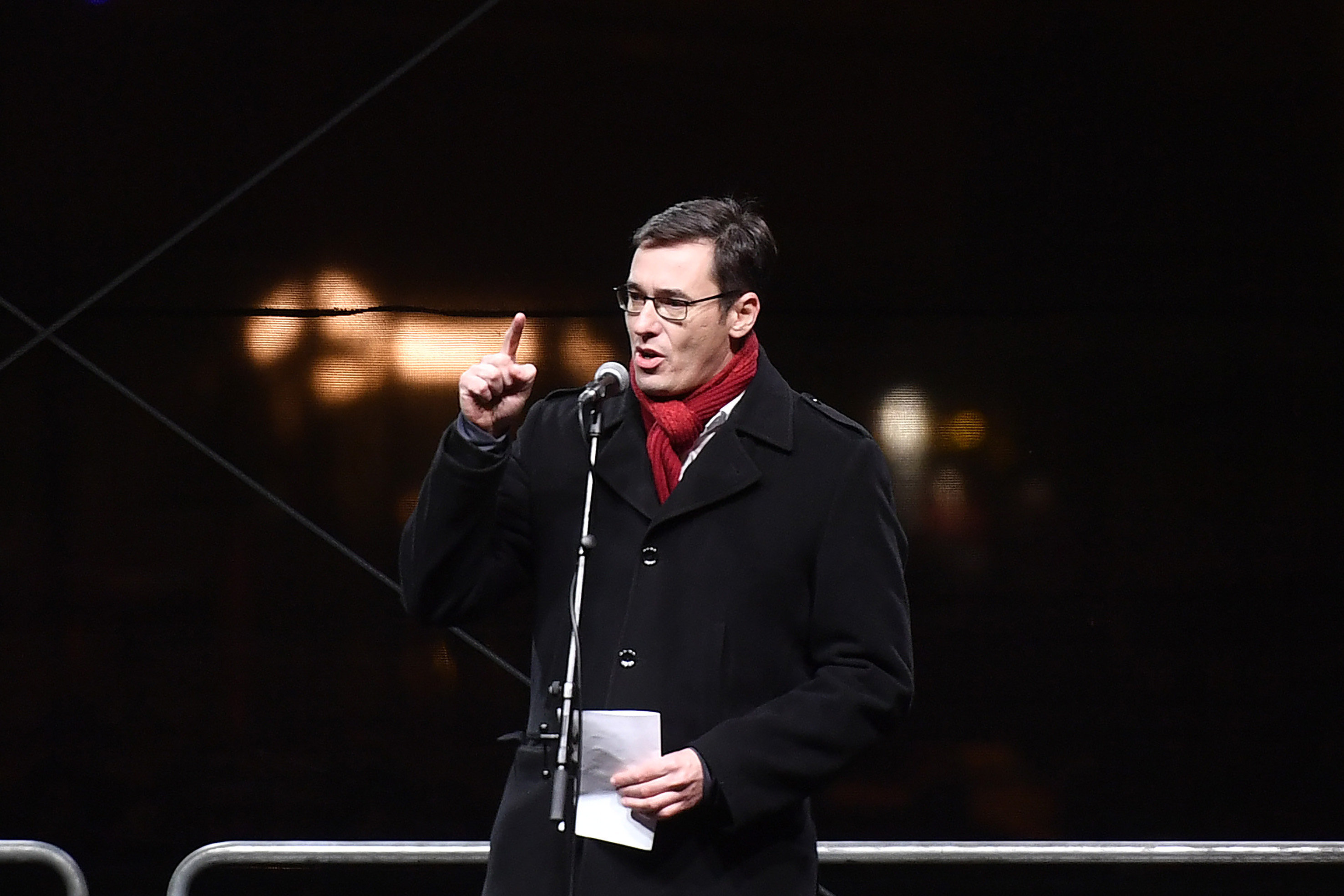"We want peace" - Roma demonstrators lead protest for judicial independence
- Stay updated on the latest news from Hungary by signing up for the free InsightHungary newsletter:
Several thousand demonstrators, including many from Roma communities around Hungary, gathered in central Budapest on Saturday to demand the government comply with a court order to pay damages to several dozen Roma victims of school segregation in the village of Gyöngyöspata.
The demonstration, titled "Free courts! Free Gyöngyöspata!", began at Nyugati railway station and marched to the Kúria, Hungary's highest court, which will hold a hearing on the case in mid-April. Participants called for judicial independence in the face of the government's refusal to make the court-ordered payments, and for an end to the social exclusion and stigmatization of Hungarian Roma. Marchers played Roma music from loudspeakers and chanted "We want peace!" and "No racism!" as they paused at the Kúria.
After marching to Kossuth Square adjacent to the Parliament, Roma activist and protest organizer Jenő Setét told the crowd that the government was using the Roma as a tool for "taking another slice" out of judicial independence. Setét recalled that on that day 11 years prior, a Roma man and his son were murdered in the village of Tatárszentgyörgy by right-wing extremists. Then, it was "murderous militias", and today, it is the government encouraging such "active hatred", Setét said.
Also speaking at the demonstration were former ombudsman for national and ethnic minorities Jenő Kaltenbach and educator and social worker Nóra L. Ritók, who said that segregation had been allowed to proliferate in many towns where Roma live in greater numbers.
"This is a situation which must be solved at the system level, from above," Ritók said. "Instead, I see that problems caused by segregation are breaking out, and the government itself is scapegoating the Roma."
"There's little chance we can avoid it, but we don't know of any coronavirus infections in Hungary" - Gulyás
The prime minister's chief of staff Gergely Gulyás held a special press conference on Wednesday morning where he said that while there are no known coronavirus infections in Hungary, "there's little chance we can avoid it".
The disease, which has now begun to spread across Europe with confirmed cases in Austria, Croatia, Greece, Norway, Romania, Switzerland, Italy and others, has been detected in two Hungarians thus far, Gulyás said: a Hungarian woman living in Vienna and a worker on a cruise ship quarantined off the coast of Japan. (The woman later tested negative for the virus - ed.) Gulyás promised that the public would be alerted as soon as a case of the virus is confirmed in Hungary.
Interior minister Sándor Pintér called for a six-party discussion of the issue on Thursday, and said the government is launching a website and Facebook page for informing citizens on how to prevent infection. The ministry has also created a hotline for anyone experiencing symptoms of the virus, which can be reached 24 hours a day at 06-80-277-455 or 06-80-277-456. The ministry can also be reached by email at koronavirus@bm.gov.hu.
Brazilian president Jair Bolsonaro will reportedly cancel his plans to visit Italy and Hungary in the coming weeks over concerns about the virus. Hungary-based budget airline WizzAir has reduced service to numerous destinations in Italy over a decline in demand for fares to the country, which has experienced the most cases of coronavirus in Europe.
European Commission gives Hungary good marks on economy, bad marks on corruption, transparency
In its annual European Semester country report, the European Commission praised Hungary's economic performance while noting a lack of improvement in areas like corruption, quality of social dialogue, transparency in decision making and education.
The report said that Hungary's rate of GDP growth is among the highest in the EU, with average growth of more than 4% since 2014. Favorable labor market trends have helped improve living conditions and reduce poverty, the report stated, while investment has risen to a record level thanks to a favorable economic outlook, easy financing conditions, supportive fiscal policy and a large inflow of EU funds.
However, the report warned that the expansion of the economy is set to reach its limits as economic growth has relied on increasing the number of workers, while output per worker has grown modestly. With the labor market near full employment, job creation may contribute less to output growth in the coming years, and a lack of skilled labor is a key obstacle to productivity-enhancing investment and innovation.
Hungary has made no progress on improving the adequacy of social assistance and unemployment benefits, and no attempts have been made to reinforce the anti-corruption framework, including by improving prosecutorial efforts and access to public information. Persisting concerns regarding judicial independence continue to go unaddressed, the report states, adding that the quality and transparency of decision-making and social dialogue is among the weakest in the EU and no steps have been taken to improve it.
Police order investigation of TikTok video mocking migrants
The National Police Headquarters has ordered an investigation into a video uploaded to social media site TikTok which appears to depict a police officer mocking a group of migrants as they walk single-file along the fence at Hungary's southern border.
"The police condemn inciteful posts and acts which damage the human dignity of others. The deputy chief of police has ordered an investigation into this particular video," the Police Headquarters told Index.
In the video, what appears to be a police officer plays a song traditionally sung at graduation ceremonies as he films a group of migrants walking on the other side of a tall barbed wire fence. The man laughs as the lyrics "Onward, onward" are sung on the recording.
Budapest to fully finance four theatres over artistic freedom concerns
Budapest Mayor Gergely Karácsony announced in a Facebook post on Tuesday that the municipality would take over financing of four theatres in the city to preserve their artistic freedom.
"Theatres which have had their artistic freedom endangered will be financed fully by the municipality so that the state will have no say in the artistic work of the Katona József Theatre, the Örkény Theatre, the Radnóti Theatre or Trafó [House of Contemporary Arts]," Karácsony wrote.
The decision came in response to an amendment to the law on culture passed by parliament in December which ties state financing of cultural institutions to greater control over the operation of those institutions by the state, including the appointment of theatre directors. Speaking at a protest against the law that month, Karácsony said he would protect the city's theatres against the "bad and harmful" law.
Karácsony said he would like to cover costs for other theatres as well, but that the city does not have adequate resources.
"This is a detestable situation, and I myself hate this law, but [...] we had to be aware that it's not only theatres that we must finance in this city," the mayor wrote. "Keeping our commitments can therefore not endanger the city's ability to operate."
New national curriculum to be introduced in September despite opposition
Minister of Human Resources Miklós Kásler told state radio on Tuesday that a new national curriculum in public schools will be ready to implement by September, and that the proportion of educators actively opposing the curriculum is low.
"We can never satisfy everyone, and this curriculum was prepared based on current capacities and represents a significant step forward compared to the previous curriculum," Kásler said. "There are around 3,000 high schools in Hungary. A total of seven schools protested against the introduction of the National Core Curriculum, and some university teachers joined them, so the proportion of protesters is [...] below one percent." (444.hu prepared a list of the nearly 30 schools where staff have officially expressed their opposition to the curriculum - ed.)



